After last week’s Riders to Watch for 2016, here is a selection of neo-pros to introduce. Previous picks have included several second year pros but this year’s intake seems so promising that all the names below are novices. Here’s a look at some promising riders with big results, fat contracts and some musical talents.
First up is Italy’s accordion-playing Gianni Moscon who has signed with Team Sky. While some teams chose to bring on young riders, some don’t. Astana and Team Sky can just buy a rider when they’re world class. Riders like Geraint Thomas and Peter Kennaugh have been nurtured but they were already part of the British system before Sky came along. The business logic is understandable as future talents come with an all to present price tag, why pay to incubate a rider when you can just buy a hatched champion? Team Sky’s recruitment is a curiosity probably explained by the Pinarello connection, after all Moscon has been riding a Pinarello with his all-conquering U23 Zalf team. Moscon hails from the miserable sounding Val di Non – actually a delightful place – in the mountains of South Tyrol and not far from the fiefdom of Franceso Moser and shares a similar built to The Sheriff. Moscon had results on hilly courses such as the Piccolo Lombardia, the U23 Tour of Lombardy but among the pros he’s likely to fit into the rouleur and classics niche. He’s similar to Salvatore Puccio who won the U23 Tour of Flanders before signing with Sky and has faded from the results, albeit as a valuable workhorse.

Remember Ilya Davidenok? If a bell rings it’s probably because he was one of the Astana development team riders busted in late 2014 for steroids, the news of which compounded with the Ignlinskiy brothers to cast a long shadow over Kazakh cycling. Davidenok was rumbled during the Tour de l’Avenir where’d he’d taken the summit finish stage win at the Plateau de Solaison only to get stripped of the win in the following weeks. The short version of this is that Sam Oomen was robbed of a stage win. Fortunately the Dutchman has made plenty of other victory salutes with the Rabobank development team. Last year he took on pros in several 2.2 status stage races in the mountains and beat most of them with podium finishes and more, he even finished eighth in the 2.1 level Tour de l’Ain meaning if he’d been a pro last year he’d have enjoyed a decent season. He then went on to finish fourth in the Tour de l’Avenir and after many impressive results in the mountains finished off the year with the U23 Paris-Tours (that’s him on the podium) and the year before he’d been third. All this and he’s just 20 too and has just got a three year contract with Giant-Alpecin, not the usual two year deal. Apparently he’s a good piano player too. Is there anything he can’t do? Maybe social media, he’s one of the rare neo-pros without a Twitter account.
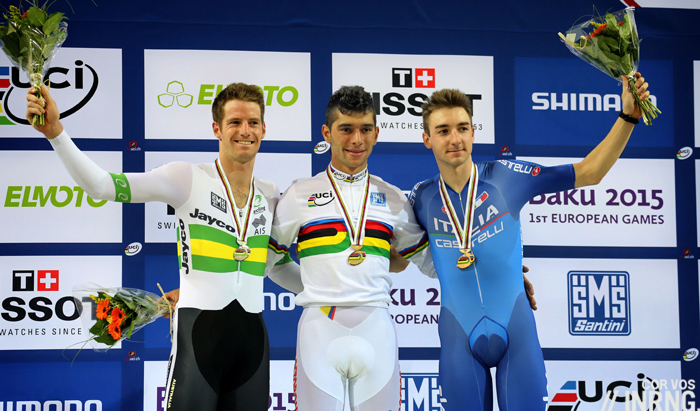
Fernando Gaviria is an obvious pick given he’s been outsprinting the best pros in the world whether in the velodrome or on the road. The amateur scalped Mark Cavendish and Sasha Modolo in the Tour de San Luis and André Greipel in the Tour of Britain and beat Elia Viviani to win the omnium title at the track Worlds. Of course San Luis was a pre-season test and Greipel’s lap of Britain was the only race he did in September, context matters. 2016 is an Olympic year and the Colombian wants to race on the track and Quickstep had been reluctant to let Cavendish focus on the track but of course they were paying him millions to deliver on the road. Gaviria is likely to be cut more slack and the road will form part of his programme. The risk is that he’s got dollar signs in his eyes and gets distracted but if not then he’s got a shot at defying the Colombian stereotype of natural born climbers. He’s got a sprinter label for obvious reasons but there might be more to come, watch for him in prologue time trials.
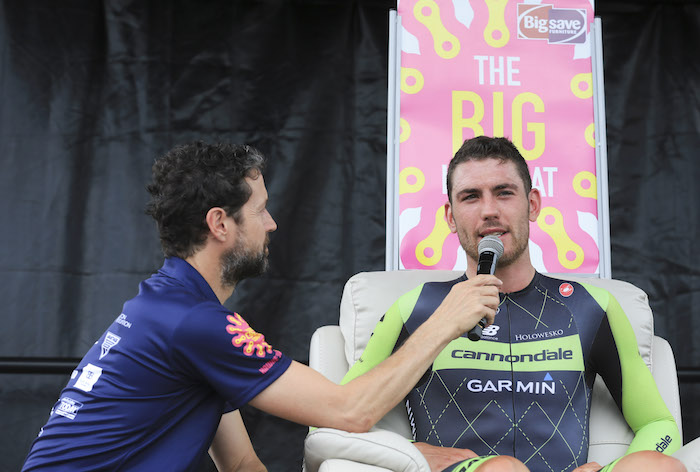
Patrick “Paddy” Bevin had a roaring 2015 with more top-10s than One Direction, in fact there were only four days in the year where he finished outside of the top-10 in pro races. Yes, go back and read that sentence. Sure it was in an abbreviated calendar of 24 days but this was impressive and he’s the latest rider to be pumped out by the Andrew Christie-Johnson pipeline and the Avanti team boss told cyclingtips “he is certainly one of the best – if not the best – rider we’ve ever had on this team“. It’ll be interesting to see how he fares. He’s thrived on the Asia Tour races, even beating the Iranians at times, and there will be a step up as he adjusts to longer races in Europe and the World Tour. He should be ripe for a few wins in 2016 in smaller events, think the Coupe de France series or a stage in some smaller Spanish stage races. He’s proven to be a fast finisher who can cope with the hills – he beat Cam Meyer to win the Arthur’s Seat finish of the Herald Sun Tour last year – and he’s just won the New Zealand time trial championships too. It’s a compliment to say he could prove an excellent lead out rider.
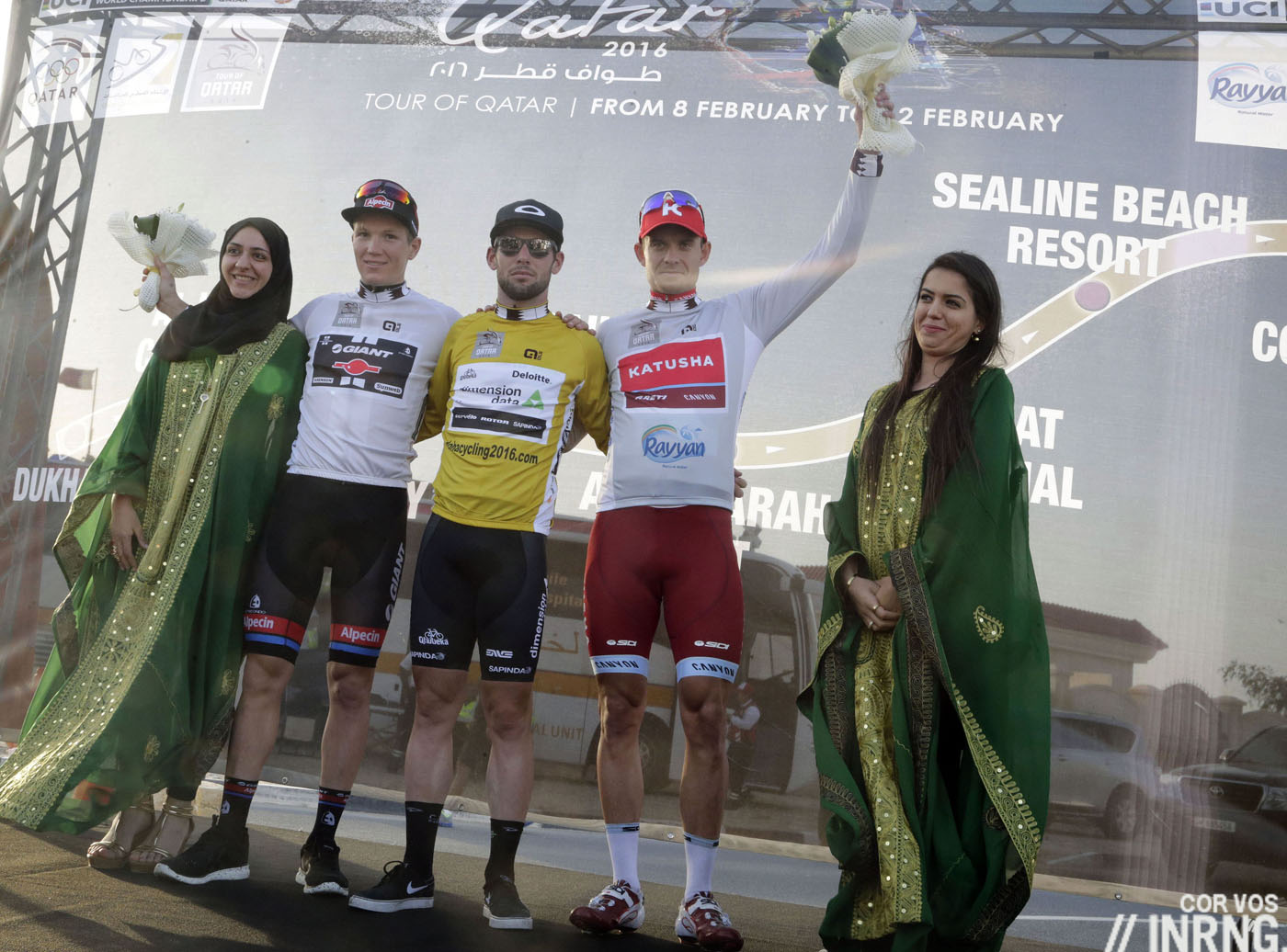
Søren Kragh Andersen could be a future classics contender but is he already a finished item? He had a storming 2015, including the prologue and sprint from a breakaway in the Tour de l’Avenir and got a ride with Giant-Alpecin on the back of this and other prodigious results. Perhaps the most promising result was third place in the Tour of Denmark’s TT stage, mixing it with the pros and he won a stage of the Tour des Fjords too. There’s something of the younger Kittel about him with his hulking thighs and time trial force but he equally become a classics hardman. In the next year or two look for him to poach a win here and there and use his bulk as a valuable addition to John Degenkolb’s sprint train.
Guillaume Martin is the one FDJ let go and that might be the best thing to happen to him. The French climber scored plenty of impressive results, notably a mountain stage of the Tour de l’Avenir and the U23 Liège-Bastogne-Liège. If French U23 cycling had a draft he’d be near the top of the pick and was a stagiaire with FDJ. Then he went and signed with Wanty-Groupe Gobert. An odd choice? FDJ’s ways are not for everyone – see how Arnold Jeannesson has vanished – and besides they’ve signed Jérémy Maison, another climber already. For Martin a ride with Wanty means a start in many hilly races and a chance to develop with less pressure.
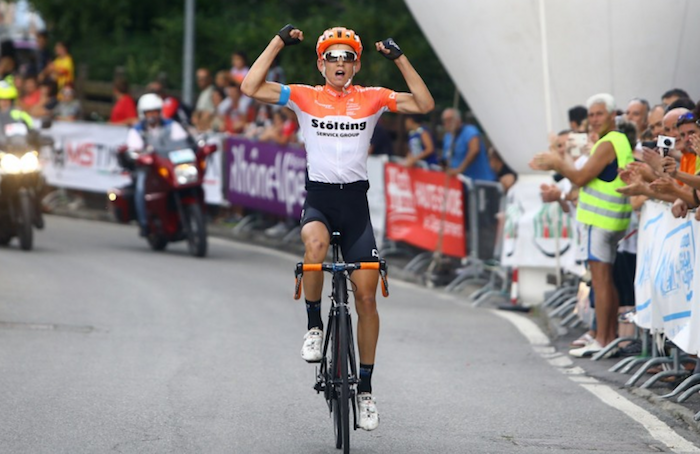
Lennard Kämna has turned pro by accident. He’s been with the Stölting continental team which has now moved up a tier to the Pro Conti level and so all the riders have been given full pro contracts, Kämna included. There’s nothing haphazard about his progress though, as a junior he won the time trial at the 2014 World Championships in Ponferrada and switched into the senior ranks last year to win the German U23 time trial title and take bronze in U23 TT race in Richmond, a huge ride for someone who’d turned 19 days before. He’s more than a time trial specialist though, taking a medium mountain stage of the Giro della Valle d’Aosta. Many managers will be watching Kämna closely with a sort of Dutch auction in place where many would like to sign him but not yet, each hoping he’ll develop at Stölting before he’s ready to sign.
What can Matvey Mamykin do? There’s a long list of promising Russian riders that vanish in the pro ranks. The likes of Igor Silin, Sergey Chertnitskiy, Petr Ignatenko, Ildar Arslanov and Aleksey Rybalkin have flashed up on the U23 scene but gone quite since. Mamykin has probably got more results than these four together so it’ll be interesting to see how he fares with Katusha, he’s proved very strong in the mountainous stage races.
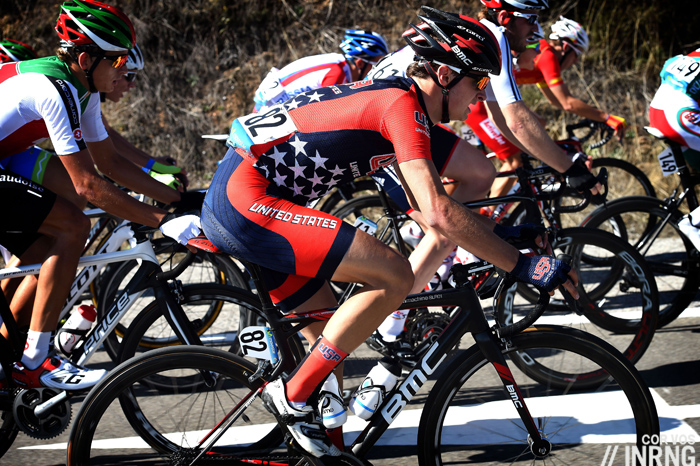
What’s with the Dutch connection ? After Christian Vande Velde, Tejay van Garderen now there’s Alexey Vermeulen, another with a Dutch connection. Perhaps nationality has played a part in recruitment at Lotto-Jumbo? Most teams want an American rider as a means to market their bike sponsors to the US market, a hook for the Tour of California and the late season races in Utah and Colorado and this could have swayed the Dutch team and their bike sponsor Bianchi. Vermeulen is promising but scanning his results he’s only cracked the top-10 in three international races this year, notably on summit finishes at the tough Ronde de l’Isard, but that’s partly because he was only 20 years old and has room to improve. He’s one of the youngest pros in the peloton and should get space to improve.
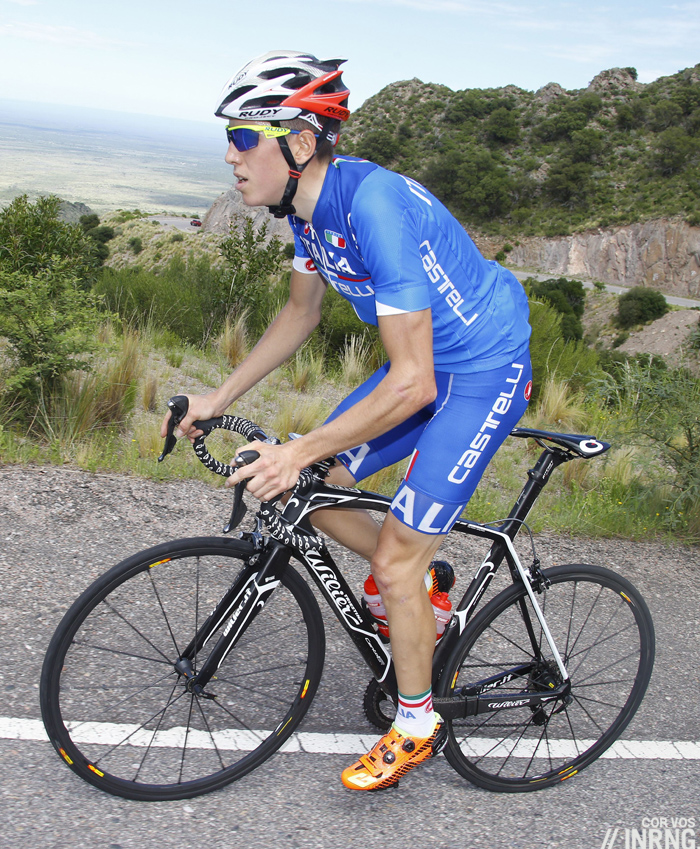
You’re bound to hear about Simone Petilli in the future. The Italian climber has signed with Lampre-Merida after a very strong final season in the U23 ranks. Often Italian climbers shine in home races but don’t export so well but Petilli won the Ronde de l’Isard stage race in the Pyrenees after taking the opening summit finish and finished fifth in the Tour de l’Avenir too. As you can see above he’s not the typical grasshopper style Italian climber but a taller, more powerful build although he’s yet to get any kind of result in a time trial meaning it’s the mountains or nothing. One day a stage win in the Giro could well be on the cards, for now he’ll already be an invaluable mountain gregario.
An eleventh rider for the list who won’t be racing. Robert Power was schooling many of those named above despite being younger than them, the only rider here born in 1995. He’s signed for Orica-Greenedge but a rare illness has given him other challenges for the coming year so we won’t see him racing for some time. Let’s wish him well.
Other names to watch include climber Jack Haig (Orica-Greenedge); son of Astana DS Davide Martinelli and the rider poached away from Lotto-Soudal Laurens de Plus (Etixx-Quickstep); potential classics poacher Lilian Calmejane (Direct Energie); Wunderkind Silvio Herklotz (Bora-Argon 18); Tour of California stage winner Toms Skujiņš (Cannondale-Garmin) to name some more… and pre-empt inevitable “you left him out” comments below.
Finally for all the names, talents and promise here remember it’s all happened before. Every pro in the peloton was once a hot shot hope. See Romain Sicard who won the Tour de l’Avenir and the U23 Worlds and is now a solid stage racer but no more. The road ahead is as much about learning, adaptation as it is with genetics and talent, just ask Campbell Flakemore and Daan Olivier who quit World Tour teams after discovering life on the road wasn’t for them.

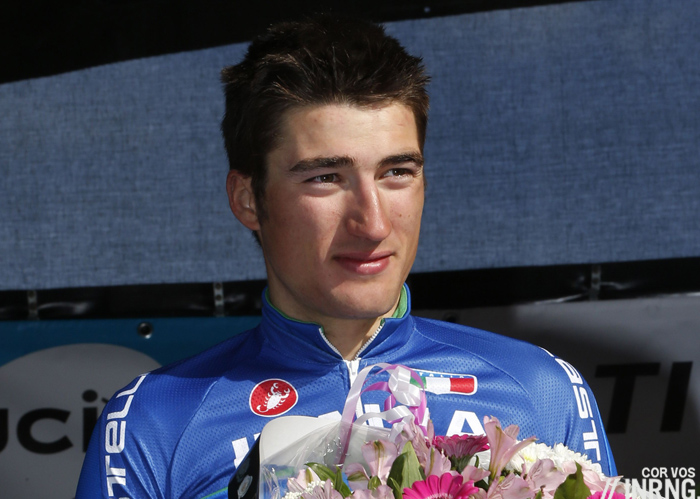
Odd situation at OGE where they only have a 25 man roster, but have already lost Robert Power for the foreseeable future so you’d think might end up short staffed. Surprised they haven’t picked up a contract-less rider like CJ Sutton for a knock down rate.
You can add Muhlberger to that list too. You mentioned Maison too, he is a proper climbing talent and it’ll be interesting to see how he goes.
Always nice to see how the neos get on.
I know it has been discussed here before (http://inrng.com/2015/09/spain-riders-under-30-generation/ and http://inrng.com/2014/10/spain-future-riders-after-contador-valverde-rodriguez/), but it still surprises me that there isn’t a young Spaniard on this year’s list nor on the 2015 list. Not that I can come up with a name.
Soler? (named in one of the articles you linked). He wouldn’t make the cut this year because, although he’s technically a neo-pro, he’s a *sophomore*, and inrng decided to include rookies only. However, the point you make is clear and I agree… several factors at play, here, and among them pure chance.
There’ll be 9 Spanish neo-pros this year.
Mikel Aristi (Delko) is a fast guy, will develop himself as a nice powerhorse.
Jorge Arcas and Antonio Pedrero, both Movistar, are tough guys who are going to be very good domestiques.
Jonathan Lastra (Caja Rural) is an appreciable talent whose limits I can’t forecast.
Diego Rubio (Caja Rural) is one of the best, classiest rouleurs Spain has produced in years. Expect him on the WorldTour in 2 years.
Alberto Gallego (Caja Rural) is a great climber who impressed everybody in 2015 Route du Sud. Him and Latour were the ones who stood longer with Contador and Nairo on the mountain stage.
Jaime Rosón (Caja Rural) is an outstanding climber. In his first race with Caja Rural as stagiaire, I’m not sure if it was Utah or Colorado, he coped great with the pros’ rhythm.
Julen Amezqueta (Southeast) is a natural born cyclist. His talent may not be unlimited, but he is a great competitor and will be a relevant pro.
And finally Cristian Rodríguez (Southeast). He is a world-class talent, touted by many as the new Comtador. Powerful climber, classy time-trialist. Gallego, Rosón and him will deliver great shows in the summit finishes in 3, maybe 4 years. Expect them standing on the most important podiums.
@FranReyesF Can I ask, why are all these riders (the two Movistar ones aside) at relatively small teams? Is that just the Spanish way or is scouting difficult in Spain?
Movistar is the only WT Spanish team, the other WT teams have their own sponsors who may prefer different nationalities, or have riders on their radar already (e.g. BMC Development Team), or Sky wanting to please Sky Italia with Moscon, or whatever.
Plus, Soler aside, it doesn’t appear that any of the Spaniards have won anything of note, whereas others have who have been the prime picks…Haig, Power, G Martin, De Plus…
Joel has a point. Having only one WT and one ProConti team limits the number of neo-pros. Furthermore, both Movistar and Caja Rural have feeder teams and don’t look elsewhere for riders.
Commercial interests-wise, The cycling industry is kinda crowded right now in Spain, so technical brands don’t consider worth to invest in more than one or two Spanish riders – à la Trek or Lotto-Soudal. Besides, because of the economic context of Spain the non-technical sponsors are not very fond of making marketing efforts in Spain, so those one or two riders are still enough – à la Etixx-Quick Step.
Sporting-wise, detecting Spanish talents is indeed difficult.
There isn’t a real high performance structure in both Junior and U23 levels, so most cyclists are undertrained and underdeveloped. This provokes two trends:
a) young Spanish cyclists don’t even hint their real potential till they are 21 or 22 and realize they’ve let go some key years in their development as riders; and
b) young Spanish riders don’t deliver interesting results at any race outside of Spain. Indeed, they usually don’t even compete abroad.
Most bigger teams go fishing talent to high-performance programs and international, high-level races. In Spain, the former doesn’t exist and the later are not profited.
Luckily, this is changing. Fundación Contador is refining its work structure and gathering the know-how they lacked on their first years. Movistar’s feeder team (Lizarte) is getting better and better – their DS Juanjo Oroz, former Euskaltel rider, really knows how to spur his riders. Fundación Euskadi, former Euskaltel, is finally starting to work as a 21st century youth team. Aldro Team, Manolo Saiz’s new squad, is working with European standards. This four u23 teams are meant to compete 10 to 20 days out of Spain this season.
And we could go on and on talking about great coaches who really are on the cutting-edge, true sport scientist that really know how to guide young talents on their development… And those talents really are there, since cycling here has a huge tradition and a real fanbase – young fellas really do ride!
So, you see, I’m optimistic about Spanish cycling’s future 🙂
Great extra info. For those not
familiar Fran Reyes is an expert on the sport and Spanish cycling in particular. Look him up on Twitter if you use it for Spanish coverage.
Gabriele and @FranReyesF thanks for the reply. The future of Spanish cycling isn’t as bad as I thought initially.
– Soler. I hadn’t done my homework properly. A winner of the GC in the Tour de l’Avenir is always a rider you’ve to watch in the years to come.
– The nine 9 neo’s this year. I do remember watching Roson in Colorado. Impressive indeed, although I thought he was Colombian. The other eight are new to me. Living north of the Pyrenees might have something to do with it.
Definitely. Spanish riders are not use to compete abroad – that limits their exposure and their ability to perform in international races. Anyway, keep in mind Rosón is not from Bogotá, but from Zamora! 😉
Great info. – thanks.
It would be interesting to see a comparison of the various U23/Development teams, especially the ones associated with WorldTeams, i.e. who came through which programs, what was the success rate of moving to the WT and PCT ranks, and where the riders who turned pro ended up.
Better learn how to say Skujiņš! Way harder than Quietcowskee?
Rob Hatch and Brian Smith just called him ‘Squinge’ last year.
Or just call him Toms, much simpler
Puccio (Sky) scored his best individual GT stage result to date last year with a 2nd in st 14 of the Vuelta. Hey, he beat one of the faves for runner up spots, JJ Rojas!
Really looking forward to seeing how Paddy Bevin gets on, he looks good in Argyle.
If you rode at the WT level as a stagiaire from Aug 1st last season, are you still considered a neo-pro?better yet, are these titles defined by the UCI or just something used by fans/journos?
That’s just a stagiaire or trainee role. Neo-pro has a strict definition as a first or second year pro with a WorldTeam or ProConti who signed aged of 25 or less. For all of the above I’ve gone for first year pros rather than second year riders even if it would have been good to mention many of the first year pros who thrived in 2015 like Küng, Latour, Bystrøm, Benoot, Soler and so on.
And, arguably, most significantly of all, Caleb Ewan :).
Not a ‘you didn’t say xxx’ gripe, but a couple of other interesting neos I’ll be looking out for are Kenneth van Rooy at TopSport and Davide Martinelli at Ettix.
Oh, and I wonder how Gaviria’s buddy Contreras will get on, also at Ettix? Think he’s more of a climber.
Contreras did well in San Luis last year but then disappeared a bit for the rest of the year. I’ve taken a punt on him in a couple of my CQ based fantasy teams for the year because he was cheap (and he did well in TDSL). Fingers crossed, but EQS don’t really have many climbers comparatively so he should get some chances, at the very least in support of Brambilla and Dan.
Moscon’s probably made a bad choice joining Sky. I know it’s a cliche, but I think generally neo-pro’s are better off at smaller teams where they get to ride for themselves more.
Sam Oomen: ‘robbed of a stage win’ by a cheat, ‘without a Twitter account’ – I’m warming to him already.
For a man with only one arm Sam Oomen has done amazingly well.